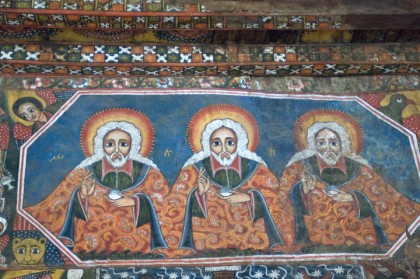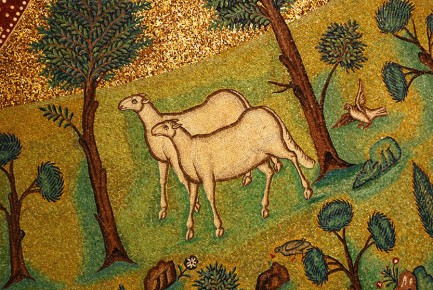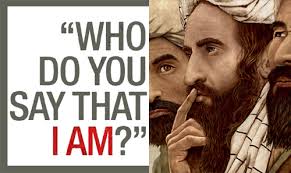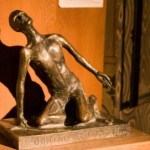It’s been an invitation and a dilemma, down through the ages, what name to use for Jesus. According to Mark it was a dilemma for the disciples. The buzz in the streets was various, and that worried them, for the names people used were different in their meanings. Some called him a prophet, some said he was Elijah come back to life, some said he was a magical healer, some said he was the Messiah. And we don’t need the gospel to tell us that there were some who called him a public nuisance and a charlatan. Those voices rise everywhere, about every leader, in every age.
What shall we say? the disciples wanted to know. Who shall we tell them you are? And from Jesus, the answer came as a question: Who do you say that I am? Peter, who loved him dearly, immediately went for the big name, Messiah. But Jesus hushed them, telling them not to say that.
 And so over the centuries we’ve come up with a number of other Power Names for Jesus, names that are as familiar to us as the name Jesus; Christ (the anointed one); Lord; Incarnate Word; Savior; Redeemer; King. These are a few of the names that bring Jesus easily to mind.
And so over the centuries we’ve come up with a number of other Power Names for Jesus, names that are as familiar to us as the name Jesus; Christ (the anointed one); Lord; Incarnate Word; Savior; Redeemer; King. These are a few of the names that bring Jesus easily to mind.
Isaiah’s prophecy of the Messiah promises he shall be called Wonderful Counselor, Mighty God, Everlasting Father and Prince of Peace. We rattle these off every Christmas, about the Babe in the Barn. King of Kings and Lord of Lords, Handel’s Messiah names him, proclaiming he shall reign for ever and ever.
But his own question, Who do you say that I am? is not answered by any of these titles. It can only be answered by a honest naming of our own experiences with him, of him. It can only be answered by spending time enough in his company to let our understanding of who he is emerge and grow.
Traditions that practice personal testimony attempt to get people to do this. But often the testimonies become rote, sounding alike, and become more like creeds than a naming of personal narratives.
His name, Jesus, came from an angel, who gave it to his mother, according to Luke, but Matthew says it was his father.
![]() The point is that most names are given to people, we don’t name ourselves. And they express things people see in us, hope for us, feel in our presence. Sarah, for instance, called her baby Isaac, meaning laughter, because of the joy she felt, and the giggles that came over her when she knew she was with child. There was power for her in picking the name of her son, as well as power in bearing a son. And Moses, whose name means drawn from the water, was given that name by Pharoah’s daughter, who pulled him from the Nile, saving his life, and then raised him as her son, giving him new life, a life in which his origins are remembered every time someone says his name.
The point is that most names are given to people, we don’t name ourselves. And they express things people see in us, hope for us, feel in our presence. Sarah, for instance, called her baby Isaac, meaning laughter, because of the joy she felt, and the giggles that came over her when she knew she was with child. There was power for her in picking the name of her son, as well as power in bearing a son. And Moses, whose name means drawn from the water, was given that name by Pharoah’s daughter, who pulled him from the Nile, saving his life, and then raised him as her son, giving him new life, a life in which his origins are remembered every time someone says his name.
 Too often the names we give one another are jeering, even mean, pointing out our bad habits, our worst moments, our sins. In the US, and in most western countries, there is a strong tendency to take people down, especially leaders, to expose clay feet. Presidents. Film stars. Even Supreme Court Justice Ruth Bader Ginsburg is being hammered for her admission that it was a martini that caused her to fall asleep during the State of the Union Address. Martini is her moniker now.
Too often the names we give one another are jeering, even mean, pointing out our bad habits, our worst moments, our sins. In the US, and in most western countries, there is a strong tendency to take people down, especially leaders, to expose clay feet. Presidents. Film stars. Even Supreme Court Justice Ruth Bader Ginsburg is being hammered for her admission that it was a martini that caused her to fall asleep during the State of the Union Address. Martini is her moniker now.
The moniker Reverend, given to me nearly 35 years ago, carries an assumption that all the names associated with Jesus are familiar to me, but in truth, many aren’t part of my personal experience. Am I saved yet? Then is Savior the name I give him? Is he my King of Kings -am I his liege? I cannot name Jesus without naming myself – there is no escaping this reality, the reality that was Sarah’s, that was Pharoah’s daughter’s, and that is mine. In it lies the utter truth of Meister Eckhart’s words, We are all called to be mothers of God . . .
 In trust, then, that I, too, am being named, I offer from my own soul’s journey, these names for Jesus: Rabbi, or Teacher, the name Magdalene called him by on Easter; Lover of My Soul, for all the times I have been comforted in my sorrows by a word of his; Friend, who bears me up and bears with me; Brother, whose spirit is as familiar to me as my own brother’s, perhaps more so; Hope, for in his tales both clarity and hope have been revealed; Laser of Justice, for his Way intervenes in my spirit whenever an argument for a different justice appears in my world; Anointed, for his blessing has over and over touched and lifted me; Good Shepherd, the name I have experienced time and again: that I, when lost, am found; Bread and Wine, for when words fail, he still sustains.
In trust, then, that I, too, am being named, I offer from my own soul’s journey, these names for Jesus: Rabbi, or Teacher, the name Magdalene called him by on Easter; Lover of My Soul, for all the times I have been comforted in my sorrows by a word of his; Friend, who bears me up and bears with me; Brother, whose spirit is as familiar to me as my own brother’s, perhaps more so; Hope, for in his tales both clarity and hope have been revealed; Laser of Justice, for his Way intervenes in my spirit whenever an argument for a different justice appears in my world; Anointed, for his blessing has over and over touched and lifted me; Good Shepherd, the name I have experienced time and again: that I, when lost, am found; Bread and Wine, for when words fail, he still sustains.
 The disciples will walk on with Jesus through the wilderness of Lent, learning as they go, as he himself is doing, the many names of the Way. And I, too, in my life, walk on in the wilderness of changing expectations, new forms of communication, my own aging, my fears and joys. I know that he will be in my ending, as he was in my beginning. And so my final name for him, and for myself, is Amen.
The disciples will walk on with Jesus through the wilderness of Lent, learning as they go, as he himself is doing, the many names of the Way. And I, too, in my life, walk on in the wilderness of changing expectations, new forms of communication, my own aging, my fears and joys. I know that he will be in my ending, as he was in my beginning. And so my final name for him, and for myself, is Amen.
_________________________________________________________
Illustrations:
1. Who Do You Say That I Am? Poster, Google Images.
2. Holy Trinity in the Church of Debra Berhan Selassie. Gondar, Ethiopia. Vanderbilt Divinity School Library, Art in the Christian Tradition.
3. Icon, Abraham, Sarah, Moses, Dmitry Shkolnik, 2000, St, Paul Orthodox Church, Dayton, Ohio. Vanderbilt Divinity School Library, Art in the Christian Tradition.
4. Ruth Bader Ginsburg, Poster, Google Images.
5. Sheep in Paradise, Mosaic in Sant Apollinaire, Ravena, Italy, AD 549. Vanderbilt Divinity School Library, Art in the Christian Tradition.
6. Lent Way. Kathy James, cloth artist. Used by permission.












